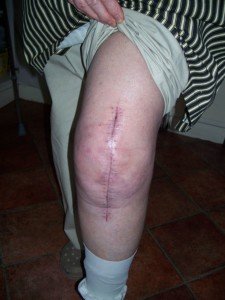Is there a way to tell the difference, without imaging, between DVT swelling and post-surgical edema or fluid retention from a joint replacement surgery?
When a joint replacement patient views their affected limb for the first time free of any bandage or wrapping, the patient is bound to be in for a shock at how swollen the limb is.
If the patient knows some basic facts about deep vein thrombosis, they may start wondering if what they’re viewing is swelling from such a blood clot.
Joint replacement surgery is a major risk factor for a deep vein thrombosis.
But a knee or hip replacement will also cause par-for-the-course swelling.
“Swelling after joint replacement can be due to lymphedema, or reactive swelling due to the surgery itself,” says Paul Lucas, MD, surgeon with the Vascular Center and director of the Vascular Laboratory at Mercy Hospital in Baltimore.
“Lymphedema can be caused by over-hydration during surgery, or by disruption or scarring of lymphatic channels near and around the soft tissues in the area of the surgery,” explains Dr. Lucas.
“Swelling may or may not be associated with a DVT. You cannot discern between them; you have to get an ultrasound to be sure that a DVT isn’t being missed.”
Your orthopedic surgeon as well as any other kind of doctor such as a vascular specialist simply cannot tell whether your swelling is from a DVT or the surgery itself.
However, the presence of other symptoms can definitely arouse high suspicion for a blood clot.
Based on other symptoms, your doctor will order an ultrasound of the limb.
Symptoms Suspicious for a DVT
- Unusual redness of the leg
- Excessive warmth in a part of the leg
- Cramping or pain in the calf, even though this area was not operated on.
- Sudden difficulty breathing (can mean a DVT dislodged and traveled to the lung).
- Sudden chest pain (another symptom of a blood clot traveling to the lung).
If you’re scheduled for joint replacement surgery, expect to see a lot of swelling the first time you see your bare skin. The puffiness can last for several weeks.
 Dr. Lucas leads a team of vascular surgeons and technologists who specialize in the diagnosis and treatment of patients with diseased blood vessels.
Dr. Lucas leads a team of vascular surgeons and technologists who specialize in the diagnosis and treatment of patients with diseased blood vessels.
 Lorra Garrick has been covering medical, fitness and cybersecurity topics for many years, having written thousands of articles for print magazines and websites, including as a ghostwriter. She’s also a former ACE-certified personal trainer.
Lorra Garrick has been covering medical, fitness and cybersecurity topics for many years, having written thousands of articles for print magazines and websites, including as a ghostwriter. She’s also a former ACE-certified personal trainer.
.


























